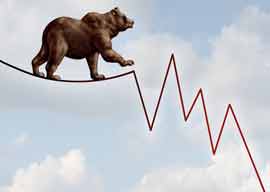
February 11, 2016

Source: Shutterstock
Meanwhile, the FT reports that the IMF is equally alarmed by the high levels of bond-fund leverage, on top of derivatives. The Fund seeks greater trading transparency “to get a sense of whether…high leverage levels are adding systemic risks to bond markets.” For example: The average leverage inside BlackRock’s Fixed Income Global Opportunities fund, over 2014, came to 746%. PIMCO and Goldman Sachs showed high (300″500%) leverage levels too. The IMF worries such high levels are “amplifier[s] of risk” in general, not least because “they are multi-sector, which could increase the risk of contagion,” said Fabio Cortes, an IMF economist. And in the event of a market downturn, “it could exacerbate investor losses,” he added.
Finally, to China. Zero Hedge invoked possible “horror stories” following a cursory look at Chinese corporate leverage. It’s common knowledge that China has a major debt problem at the macro level; however, the problem “may be even bigger than expected because…China’s most recent debt has soared from the infamous level of 282% as of mid 2014, to an unprecedented 346% currently,” as Rabobank found in one analysis. Tyler Durden points to other “highly disturbing” news, revealed by the FT, highlighting that Chinese corporate leverage, represented by the traditional debt/EBITDA ratio, is “absolutely ludicrous” in some cases. “When you have such leverage ratios as 83x, one can only…hide, and hunker down ahead of the coming explosion,” said Zero’s Tyler Durden. Some estimate that more than three-quarters of leveraged commodity companies are “dead zombies” walking, suggesting a massive default wave is about to be unleashed.
Japan is calling upon China to impose capital controls in order to curb capital outflows that diminish the value of the renminbi, the FT reports. “Since August China has lost about $320 billion of foreign exchange reserves in trying to prevent its currency from falling too fast.” China injected Rmb 1.6 trillion into its banking system over the first three weeks of 2016 alone, say analysts at UBS”versus Rmb 188 billion in the fourth quarter of 2015. At this rate, China will one day run out of choices, even with a $3.3 trillion stockpile. And if so, capital controls may well be considered.
From NIRP to capital controls to…what next?
A sound bite on a Bloomberg TV News roundtable, heard on Feb. 9, summarized the markets neatly. “The only thing not to short right now is…volatility.” You don”t need an expert to tell you a lot more turbulence is coming, in all markets, in the weeks ahead.